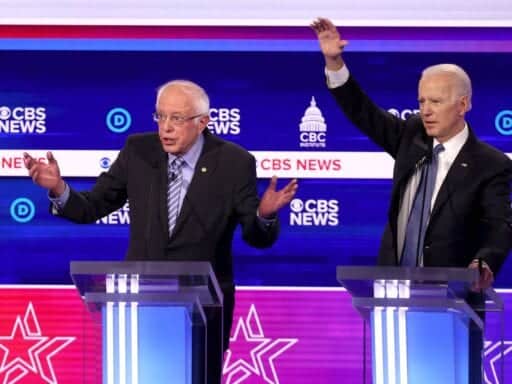Candidates will be onstage in Arizona for the 11th debate of the primary.
Believe it or not, there are still more Democratic debates: After three in quick succession in February, the next debate — No. 11 — will take place on Sunday, March 15, in Phoenix, Arizona.
The debate will be co-hosted by CNN and Univision and is two days ahead of a busy election night, when Arizona, Florida, Illinois, and Ohio vote. CHC Bold — a political action committee affiliated with the Congressional Hispanic Caucus — has partnered with the Democratic National Committee (DNC) for the debate. The debate starts at 8 pm ET and will run for about two hours; Dana Bash and Jake Tapper of CNN, along with Jorge Ramos of Univision, will moderate.
The March debate (probably) won’t be the last. The DNC’s plan calls for 12 debates in the 2020 Democratic presidential primary, with the last on a yet-to-be-announced date in April.
The criteria to qualify haven’t been announced yet, but the reduced field means the March debate will be the smallest of the primary so far.
Previously, candidates have been required to win pledged delegates to the Democratic National Convention, exceed a certain number of individual donations, or meet a polling threshold in order to qualify for the debates, but it’s unknown how those requirements might change as the primary race moves into its later phases.
A smaller field of candidates
From the ninth Democratic debate to the 10th, the debate stage actually grew, from six candidates to seven. That’s not going to happen this time: Since the debate in South Carolina, five candidates — former South Bend, Indiana, Mayor Pete Buttigieg; Sens. Elizabeth Warren and Amy Klobuchar; and billionaires Tom Steyer and Mike Bloomberg — have bowed out of the race, leaving the Democratic field at just three.
Of those three, former Vice President Joe Biden and Sen. Bernie Sanders — the two frontrunners for the Democratic nomination — are certain to be onstage. Rep. Tulsi Gabbard, however, is a definite maybe. She would qualify under the rules of the 10th debate but, mathematically speaking, she’s way out of contention to win even a plurality of delegates to the Democratic National Convention and hasn’t been a factor in the race for a while. As Vox’s Sean Collins explained, “it’s not clear if she will be invited”:
Xochitl Hinojosa, the Democratic National Committee’s communications director, tweeted Tuesday evening that “of course the threshold will go up.” “By the time we have the March debate, almost 2,000 delegates will be allocated,” Hinojosa wrote. “The threshold will reflect where we are in the race, as it always has.”
It’s also possible that Gabbard will be out of the race by March 15, in which case a two-candidate debate stage is assured.
Regardless, the March debate is likely to be eventful. After massively outperforming expectations on Super Tuesday, Biden is firmly back in contention for the nomination with a consolidated moderate lane behind him. With California still counting votes, it’s still unclear whether he or Sanders holds the lead in delegates, but it’s unquestionably a two-man race, and the reduced debate stage could give both candidates plenty of chances to take each other on directly.
So while there are still a few unknowns, we can certainly look forward to a smaller — and probably much punchier — debate in March.
Author: Cameron Peters
Read More



